初中虚拟语气讲解及专项练习与答案(带解析)复习进程
- 格式:doc
- 大小:34.50 KB
- 文档页数:9
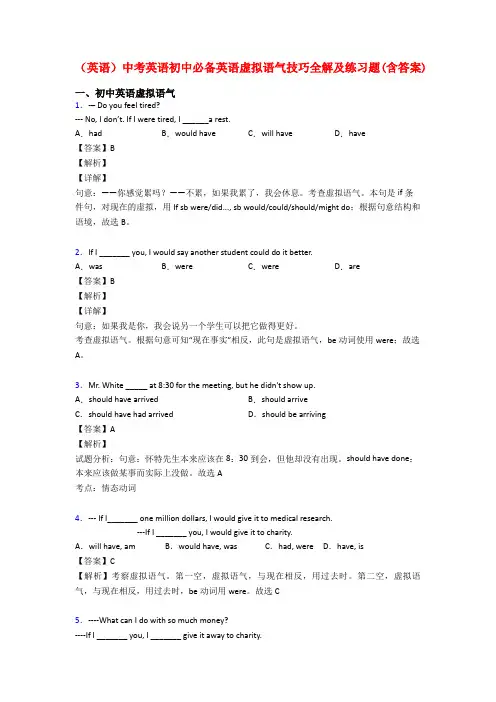
(英语)中考英语初中必备英语虚拟语气技巧全解及练习题(含答案)一、初中英语虚拟语气1.-– Do you feel tired?--- No, I don’t. If I were tired, I ______a rest.A.had B.would have C.will have D.have【答案】B【解析】【详解】句意:——你感觉累吗?——不累,如果我累了,我会休息。
考查虚拟语气。
本句是if条件句,对现在的虚拟,用If sb were/did..., sb would/could/should/might do;根据句意结构和语境,故选B。
2.If I _______ you, I would say another student could do it better.A.was B.were C.were D.are【答案】B【解析】【详解】句意:如果我是你,我会说另一个学生可以把它做得更好。
考查虚拟语气。
根据句意可知“现在事实”相反,此句是虚拟语气,be动词使用were;故选A。
3.Mr. White _____ at 8:30 for the meeting, but he didn't show up.A.should have arrived B.should arriveC.should have had arrived D.should be arriving【答案】A【解析】试题分析:句意:怀特先生本来应该在8:30到会,但他却没有出现。
should have done:本来应该做某事而实际上没做。
故选A考点:情态动词4.--- If I_______ one million dollars, I would give it to medical research.---If I _______ you, I would give it to charity.A.will have, am B.would have, was C.had, were D.have, is【答案】C【解析】考察虚拟语气。
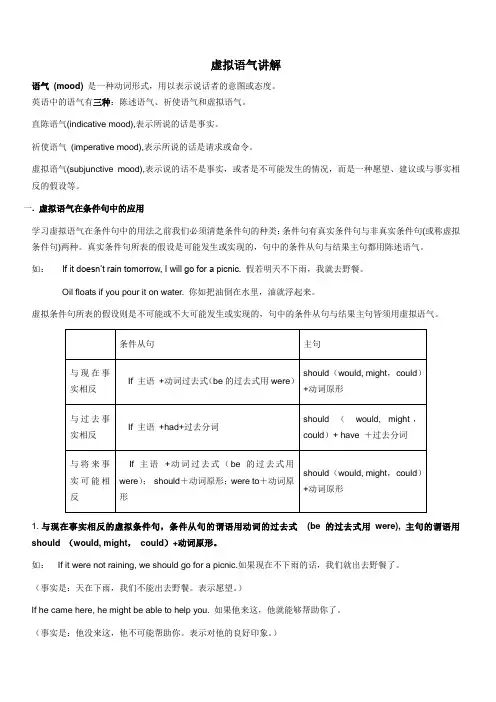
虚拟语气讲解语气(mood) 是一种动词形式,用以表示说话者的意图或态度。
英语中的语气有三种:陈述语气、祈使语气和虚拟语气。
直陈语气(indicative mood),表示所说的话是事实。
祈使语气(imperative mood),表示所说的话是请求或命令。
虚拟语气(subjunctive mood),表示说的话不是事实,或者是不可能发生的情况,而是一种愿望、建议或与事实相反的假设等。
一. 虚拟语气在条件句中的应用学习虚拟语气在条件句中的用法之前我们必须清楚条件句的种类:条件句有真实条件句与非真实条件句(或称虚拟条件句)两种。
真实条件句所表的假设是可能发生或实现的,句中的条件从句与结果主句都用陈述语气。
如:If it doesn’t rain tomorrow, I will go for a picnic. 假若明天不下雨,我就去野餐。
Oil floats if you pour it on water. 你如把油倒在水里,油就浮起来。
虚拟条件句所表的假设则是不可能或不大可能发生或实现的,句中的条件从句与结果主句皆须用虚拟语气。
条件从句主句与现在事实相反If 主语+动词过去式(be的过去式用were)should (would, might,could)+动词原形与过去事实相反If 主语+had+过去分词should (would, might,could)+ have +过去分词与将来事实可能相反If 主语+动词过去式(be的过去式用were);should+动词原形;were to+动词原形should (would, might,could)+动词原形1. 与现在事实相反的虚拟条件句,条件从句的谓语用动词的过去式(be的过去式用were), 主句的谓语用should (would, might,could)+动词原形。
如:If it were not raining, we should go for a picnic.如果现在不下雨的话,我们就出去野餐了。
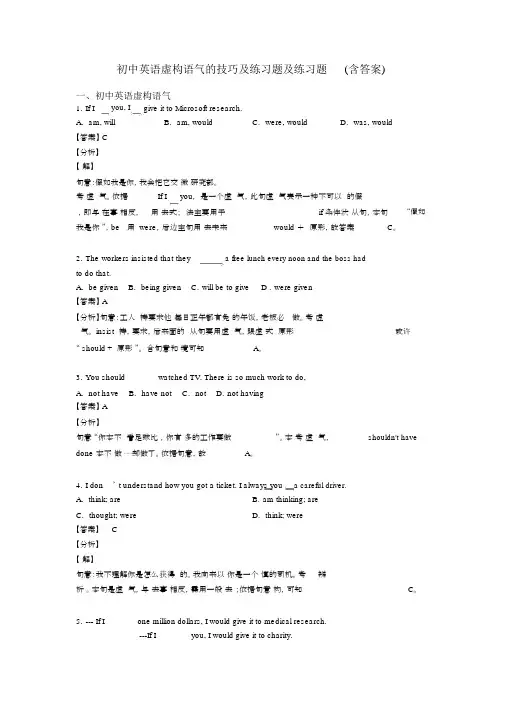
初中英语虚构语气的技巧及练习题及练习题(含答案)一、初中英语虚构语气1.If I you, I give it to Microsoft research.A. am, will【答案】 CB. am, would C. were, would D. was, would【分析】【解】句意:假如我是你,我会把它交微研究部。
考虚气。
依据If I you,是一个虚气,此句虚气表示一种不可以的假,即与在事相反,用去式;法主要用于if 条件状从句,本句我是你”,be 用 were,后边主句用去未来would +原形,故答案C。
“假如2.The workers insisted that they a free lunch every noon and the boss hadto do that.A. be given B. being given C.will be to give D .were given【答案】 A【分析】句意:工人持要求他每日正午都有免的午饭,老板必做。
考虚气。
insist 持,要求,后来面的从句要用虚气,跟虚式原形“ should + 原形”。
合句意和境可知A。
或许3.You should_______ watched TV. There is so much work to do,A. not have B. have not C. not D.not having【答案】 A【分析】句意“你本不看足球比,你有多的工作要做”。
本考虚气,shouldn't have done 本不做⋯⋯却做了。
依据句意,故A。
4.I don’ t understand how you got a ticket. I always you a careful driver.A. think; are C. thought; were B.am thinking; are D. think; were【答案】【分析】【解】C句意:我不理解你是怎么获得的。
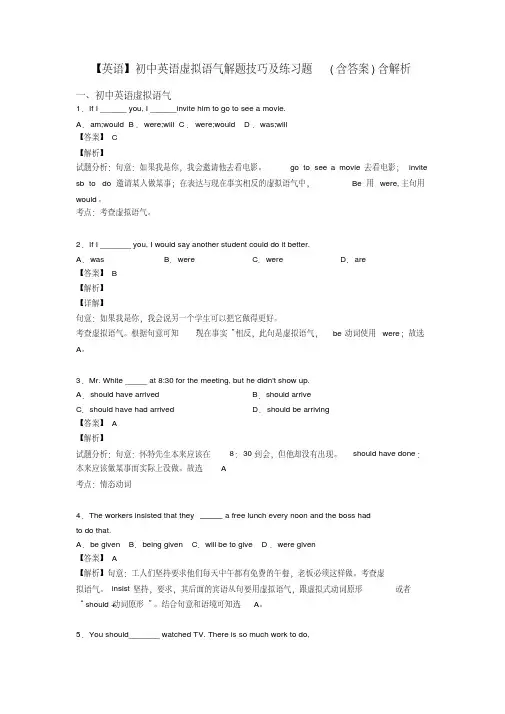
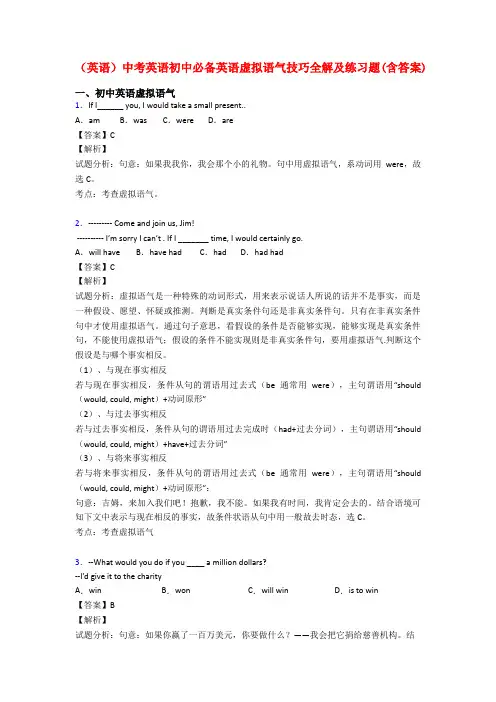
(英语)中考英语初中必备英语虚拟语气技巧全解及练习题(含答案)一、初中英语虚拟语气1.If I______ you, I would take a small present..A.am B.was C.were D.are【答案】C【解析】试题分析:句意:如果我我你,我会那个小的礼物。
句中用虚拟语气,系动词用were,故选C。
考点:考查虚拟语气。
2.--------- Come and join us, Jim!---------- I’m sorry I can’t . If I _______ time, I would certainly go.A.will have B.have had C.had D.had had【答案】C【解析】试题分析:虚拟语气是一种特殊的动词形式,用来表示说话人所说的话并不是事实,而是一种假设、愿望、怀疑或推测。
判断是真实条件句还是非真实条件句。
只有在非真实条件句中才使用虚拟语气。
通过句子意思,看假设的条件是否能够实现,能够实现是真实条件句,不能使用虚拟语气;假设的条件不能实现则是非真实条件句,要用虚拟语气.判断这个假设是与哪个事实相反。
(1)、与现在事实相反若与现在事实相反,条件从句的谓语用过去式(be通常用were),主句谓语用“should (would, could, might)+动词原形”(2)、与过去事实相反若与过去事实相反,条件从句的谓语用过去完成时(had+过去分词),主句谓语用“should (would, could, might)+have+过去分词”(3)、与将来事实相反若与将来事实相反,条件从句的谓语用过去式(be通常用were),主句谓语用“should (would, could, might)+动词原形”:句意:吉姆,来加入我们吧!抱歉,我不能。
如果我有时间,我肯定会去的。
结合语境可知下文中表示与现在相反的事实,故条件状语从句中用一般故去时态,选C。
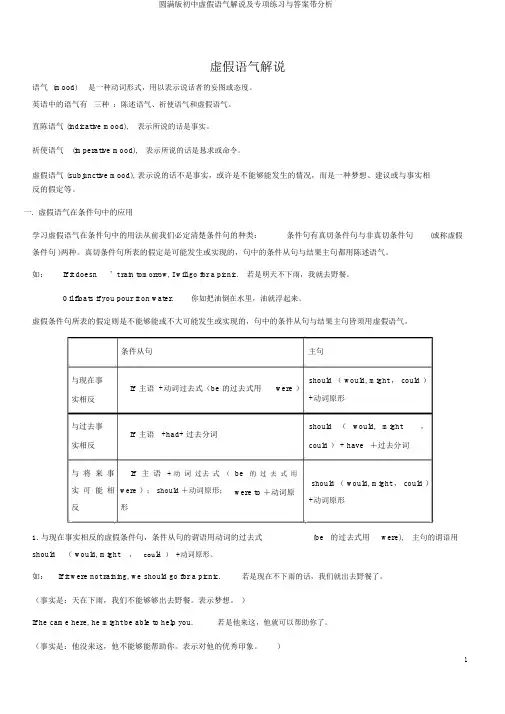
虚假语气解说语气 (mood)是一种动词形式,用以表示说话者的妄图或态度。
英语中的语气有三种:陈述语气、祈使语气和虚假语气。
直陈语气 (indicative mood),表示所说的话是事实。
祈使语气(imperative mood),表示所说的话是恳求或命令。
虚假语气 (subjunctive mood), 表示说的话不是事实,或许是不能够能发生的情况,而是一种梦想、建议或与事实相反的假定等。
一. 虚假语气在条件句中的应用学习虚假语气在条件句中的用法从前我们必定清楚条件句的种类:条件句有真切条件句与非真切条件句(或称虚假条件句 )两种。
真切条件句所表的假定是可能发生或实现的,句中的条件从句与结果主句都用陈述语气。
如:If it doesn’t rain tomorrow, I will go for a picnic.若是明天不下雨,我就去野餐。
Oil floats if you pour it on water.你如把油倒在水里,油就浮起来。
虚假条件句所表的假定则是不能够能或不大可能发生或实现的,句中的条件从句与结果主句皆须用虚假语气。
条件从句主句与现在事should ( would, might , could )If 主语 +动词过去式(be 的过去式用were )实相反+动词原形与过去事should ( would, might,If 主语+had+ 过去分词实相反could ) + have+过去分词与将来事If主语+ 动词过去式(实可能相were ); should +动词原形;反形be的过去式用should ( would, might , could )were to +动词原+动词原形1. 与现在事实相反的虚假条件句,条件从句的谓语用动词的过去式(be的过去式用were),主句的谓语用should ( would, might,could)+动词原形。
如:If it were not raining, we should go for a picnic.若是现在不下雨的话,我们就出去野餐了。
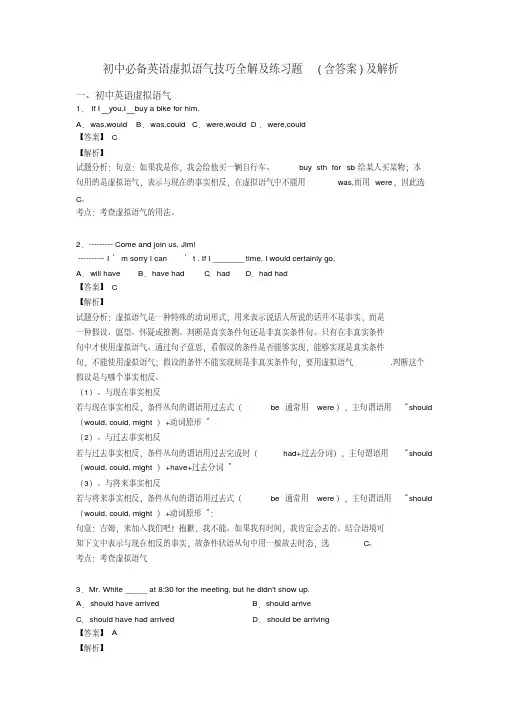
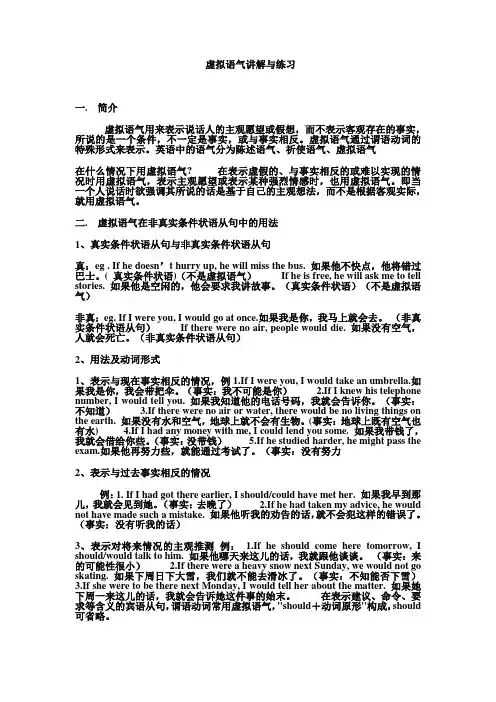
虚拟语气讲解与练习一. 简介虚拟语气用来表示说话人的主观愿望或假想,而不表示客观存在的事实,所说的是一个条件,不一定是事实,或与事实相反。
虚拟语气通过谓语动词的特殊形式来表示。
英语中的语气分为陈述语气、祈使语气、虚拟语气在什么情况下用虚拟语气? 在表示虚假的、与事实相反的或难以实现的情况时用虚拟语气,表示主观愿望或表示某种强烈情感时,也用虚拟语气。
即当一个人说话时欲强调其所说的话是基于自己的主观想法,而不是根据客观实际,就用虚拟语气。
二. 虚拟语气在非真实条件状语从句中的用法1、真实条件状语从句与非真实条件状语从句真:eg . If he doesn’t hurry up, he will miss the bus. 如果他不快点,他将错过巴士。
( 真实条件状语)(不是虚拟语气)If he is free, he will ask me to tell stories. 如果他是空闲的,他会要求我讲故事。
(真实条件状语)(不是虚拟语气)非真:eg. If I were you, I would go at once.如果我是你,我马上就会去。
(非真实条件状语从句)If there were no air, people would die. 如果没有空气,人就会死亡。
(非真实条件状语从句)2、用法及动词形式1、表示与现在事实相反的情况,例1.If I were you, I would take an umbrella.如果我是你,我会带把伞。
(事实:我不可能是你) 2.If I knew his telephone number, I would tell you. 如果我知道他的电话号码,我就会告诉你。
(事实:不知道) 3.If there were no air or water, there would be no living things on the earth. 如果没有水和空气,地球上就不会有生物。
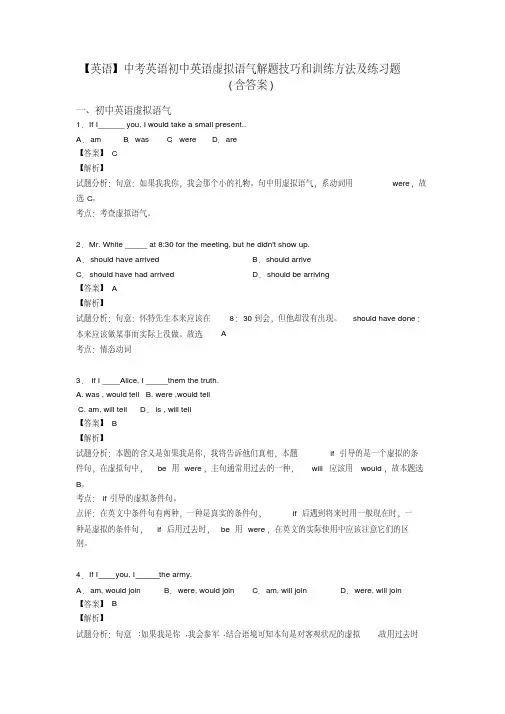
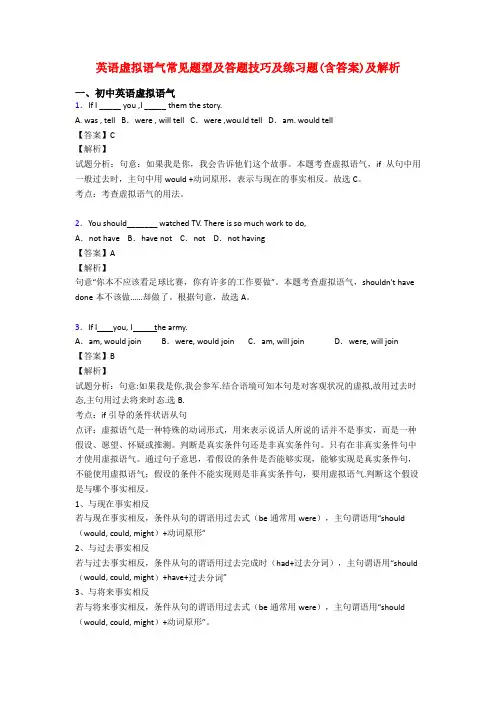
英语虚拟语气常见题型及答题技巧及练习题(含答案)及解析一、初中英语虚拟语气1.If I _____ you ,I _____ them the story.A. was , tell B.were , will tell C.were ,wou ld tell D.am. would tell【答案】C【解析】试题分析:句意:如果我是你,我会告诉他们这个故事。
本题考查虚拟语气,if 从句中用一般过去时,主句中用would +动词原形,表示与现在的事实相反。
故选C。
考点:考查虚拟语气的用法。
2.You should_______ watched TV. There is so much work to do,A.not have B.have not C.not D.not having【答案】A【解析】句意“你本不应该看足球比赛,你有许多的工作要做”。
本题考查虚拟语气,shouldn't have done本不该做……却做了。
根据句意,故选A。
3.If I you, I the army.A.am, would join B.were, would join C.am, will join D.were, will join【答案】B【解析】试题分析:句意:如果我是你,我会参军.结合语境可知本句是对客观状况的虚拟,故用过去时态,主句用过去将来时态.选B.考点:if引导的条件状语从句点评:虚拟语气是一种特殊的动词形式,用来表示说话人所说的话并不是事实,而是一种假设、愿望、怀疑或推测。
判断是真实条件句还是非真实条件句。
只有在非真实条件句中才使用虚拟语气。
通过句子意思,看假设的条件是否能够实现,能够实现是真实条件句,不能使用虚拟语气;假设的条件不能实现则是非真实条件句,要用虚拟语气.判断这个假设是与哪个事实相反。
1、与现在事实相反若与现在事实相反,条件从句的谓语用过去式(be通常用were),主句谓语用“should (would, could, might)+动词原形”2、与过去事实相反若与过去事实相反,条件从句的谓语用过去完成时(had+过去分词),主句谓语用“should (would, could, might)+have+过去分词”3、与将来事实相反若与将来事实相反,条件从句的谓语用过去式(be通常用were),主句谓语用“should (would, could, might)+动词原形”。
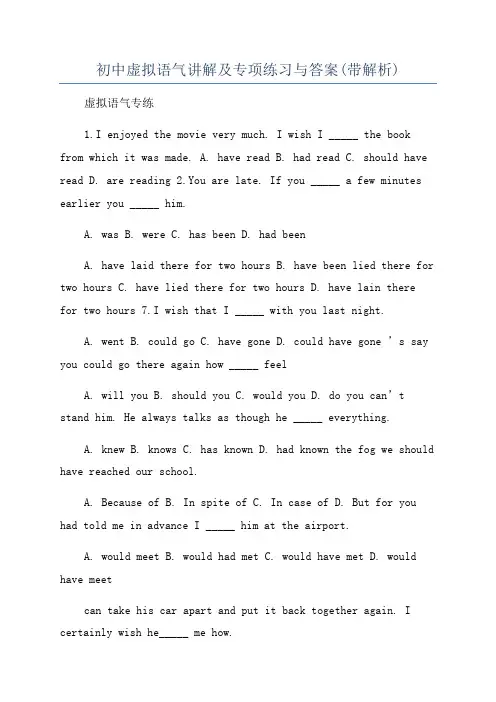
初中虚拟语气讲解及专项练习与答案(带解析)虚拟语气专练1.I enjoyed the movie very much. I wish I _____ the book from which it was made. A. have read B. had read C. should have read D. are reading2.You are late. If you _____ a few minutes earlier you _____ him.A. wasB. wereC. has beenD. had beenA. have laid there for two hoursB. have been lied there for two hoursC. have lied there for two hoursD. have lain therefor two hours 7.I wish that I _____ with you last night.A. wentB. could goC. have goneD. could have gone ’s say you could go there again how _____ feelA. will youB. should youC. would youD. do you can’t stand him. He always talks as though he _____ everything.A. knewB. knowsC. has knownD. had known the fog we should have reached our school.A. Because ofB. In spite ofC. In case ofD. But for you had told me in advance I _____ him at the airport.A. would meetB. would had metC. would have metD. would have meetcan take his car apart and put it back together again. I certainly wish he_____ me how.A. teachesB. will teachC. has taughtD. would teachwould have told him the answer had it been possible but I_____ so busy then.A. had beenB. wereC. wasD. would be ’s working hard for fear that he _____.A. should fall behindB. fell behindC. may fall behindD. would fallen behind 15.If it _____ another ten minutes the game would have been called off.A. had rainedB. would have rainedC. have seenD. rained suggested that they _____ use a trick instead of fighting.A. ShouldB. wouldC. doD. hadfather did not go to New York the doctor suggested that he _____ there.A. had hadB. have hadC. hadD. would have had you rather I _____ buying a new bikeA. decided againstB. will decide againstC. have decidedD. shall decide againstA. go to sleepB. went to sleepC. go to bedD. went to bed21.—Why didn’t you buy a new car —I would have bought one if I _____ enough money.A. hadB. have hadC. would haveD. had had she could sew _____.A. she make a dressB. she would have made a shirtC. she will make a shirtD. she would had made a coat today he would get there by Friday.A. Would he leaveB. Was he leavingC. Were he to leaveD. If he leaves doctor suggested that he _____ a short trip abroad.A. will takeB. would takeC. takeD. tookBakers arrived las t night. If they’d only let us know earlier_____ at the station.A. we’d meet themB. we’ll meet themC. we’d have met themD. we’ve met themI _____ you I _____ more attention to English idioms and phrases.A. was shall payB. am will payC. would be would payD. were would pay might have failed if you _____ us a helping hand.A. have not givenB. would not giveC. had not givenD. did not give law requires that everyone _____ his car checked at least once a year.A. hasB. hadC. haveD. will have is strange that he _____ so.A. would sayB. would speakC. should sayD. will speak I known her name _____A. or does she know mineB. and where does she liveC. she would be beautiful.D. I would have invited her to lunch. 31.He has just arrived but he talks as if he _____ all about that. A. know B. knows C. known D. knew32.If I _____ the money I would have bought a much bigger car.A. possessedB. ownedC. hadD. had had33.He was very busy yesterday otherwise he _____ to the meeting.librarian insists that John _____ no more books from the library before he returns all the books he has borrowed.A. will takeB. tookC. takeD. takes35.I left very early last night but I wish I _____ so early.A. hadB. didn’t haveC. had hadD. havewish that you _____ suc h a bad headache because I’m sure that you would have enjoyed the concert.A. hadn’tB. didn’t have hadC. hadn’t hadD. hadn’t have insisted that we all _____ in his office at one o’clock.A. beB. to beC. would beD. shall becouldn’t go to France after all. That’s too bad. I’m sure she would have enjoyed it if _____.A. she’s goneB. she’ll goC. she’d goneD. she’d gomust go there earlier. John has suggested that I _____ an hour before the discussion begins.A. goB. shall goC. will goD. would go英语虚拟语气讲解语气 (mood) 是一种动词形式,用以表示说话者的意图或态度。
(英语)初中必备英语虚拟语气技巧全解及练习题(含答案)及解析一、初中英语虚拟语气1.---Can you tell me what to wear at the party?---If I ___you,I___the blue jeans.A.was,will wear B.am,will wear C.were,would wear D.were,wore【答案】C【解析】试题分析:句意:---你能告诉我穿什么参加聚会吗?---如果我是你,我会穿蓝色的牛仔裤。
本题考查的是虚拟条件句中主句和从句的时态问题。
用if引导的虚拟条件句,虚拟现在时表示与现在事实相反的假设,其if 从句的谓语形式用动词的过去式(be 一般用were),主句用would/ should/ could/ might +动词原形,例如:If I were in your position I would marry her.结合语境可知应选C。
考点:考查虚拟语态。
2.If I not so busy ,I with you .A.was , would go B.were , would goC.was , should go D.were , will go【答案】B【解析】句意“如果我不忙,我就跟你去”。
本题考查对将来的虚拟语气。
即“if+过去时,主语+should/would/could/might do”结构。
故选B。
点睛:3.The workers insisted that they a free lunch every noon and the boss hadto do that.A.be given B.being given C.will be to give D.were given【答案】A【解析】句意:工人们坚持要求他们每天中午都有免费的午餐,老板必须这样做。
考查虚拟语气。
insist坚持,要求,其后面的宾语从句要用虚拟语气,跟虚拟式动词原形或者“should + 动词原形” 。
(完整版)虚拟语气讲解及练习题(含答案和解释)虚拟语气讲解与练习黄志刚2013.10.一. 简介虚拟语气用来表示说话人的主观愿望或假想,而不表示客观存在的事实,所说的是一个条件,不一定是事实,或与事实相反。
虚拟语气通过谓语动词的特殊形式来表示。
英语中的语气分为陈述语气、祈使语气、虚拟语气在什么情况下用虚拟语气? 在表示虚假的、与事实相反的或难以实现的情况时用虚拟语气,表示主观愿望或表示某种强烈情感时,也用虚拟语气。
即当一个人说话时欲强调其所说的话是基于自己的主观想法,而不是根据客观实际,就用虚拟语气。
二. 虚拟语气在非真实条件状语从句中的用法1、真实条件状语从句与非真实条件状语从句真:eg . If he doesn’t hurry up, he will miss the bus. 如果他不快点,他将错过巴士。
( 真实条件状语)(不是虚拟语气)If he is free, he will ask me to tell stories. 如果他是空闲的,他会要求我讲故事。
(真实条件状语)(不是虚拟语气)非真:eg. If I were you, I would go at once.如果我是你,我马上就会去。
(非真实条件状语从句)If there were no air, people would die. 如果没有空气,人就会死亡。
(非真实条件状语从句)2、用法及动词形式1、表示与现在事实相反的情况,例1.If I were you, I would take an umbrella.如果我是你,我会带把伞。
(事实:我不可能是你) 2.If I knew his telephone number, I would tell you. 如果我知道他的电话号码,我就会告诉你。
(事实:不知道) 3.If there were no air orwater, there would be no living things on the earth. 如果没有水和空气,地球上就不会有生物。
(英语)初中英语虚拟语气答题技巧及练习题(含答案)含解析一、初中英语虚拟语气1.If I _____ you ,I _____ them the story.A. was , tell B.were , will tell C.were ,wou ld tell D.am. would tell【答案】C【解析】试题分析:句意:如果我是你,我会告诉他们这个故事。
本题考查虚拟语气,if 从句中用一般过去时,主句中用would +动词原形,表示与现在的事实相反。
故选C。
考点:考查虚拟语气的用法。
2.The workers insisted that they a free lunch every noon and the boss hadto do that.A.be given B.being given C.will be to give D.were given【答案】A【解析】句意:工人们坚持要求他们每天中午都有免费的午餐,老板必须这样做。
考查虚拟语气。
insist坚持,要求,其后面的宾语从句要用虚拟语气,跟虚拟式动词原形或者“should + 动词原形” 。
结合句意和语境可知选A。
3.--- If I_______ one million dollars, I would give it to medical research.---If I _______ you, I would give it to charity.A.will have, am B.would have, was C.had, were D.have, is【答案】C【解析】考察虚拟语气。
第一空,虚拟语气,与现在相反,用过去时。
第二空,虚拟语气,与现在相反,用过去时,be动词用were。
故选C4.--What would you do if you ____ a million dollars?--I’d give it to the charityA.win B.won C.will win D.is to win【答案】B【解析】试题分析:句意:如果你赢了一百万美元,你要做什么?——我会把它捐给慈善机构。
初中必备英语虚拟语气技巧全解及练习题(含答案)及解析一、初中英语虚拟语气1.If I______ you, I would take a small present..A.am B.was C.were D.are【答案】C【解析】试题分析:句意:如果我我你,我会那个小的礼物。
句中用虚拟语气,系动词用were,故选C。
考点:考查虚拟语气。
2.--What would you do if you ____ a million dollars?--I’d give it to the charityA.win B.won C.will win D.is to win【答案】B【解析】试题分析:句意:如果你赢了一百万美元,你要做什么?——我会把它捐给慈善机构。
结合语境可知条件从句中描述的是与将来相反的事实,故用一般过去时态,选B。
考点:if引导的条件状语从句点评:虚拟语气是一种特殊的动词形式,用来表示说话人所说的话并不是事实,而是一种假设、愿望、怀疑或推测。
判断是真实条件句还是非真实条件句。
只有在非真实条件句中才使用虚拟语气。
通过句子意思,看假设的条件是否能够实现,能够实现是真实条件句,不能使用虚拟语气;假设的条件不能实现则是非真实条件句,要用虚拟语气.判断这个假设是与哪个事实相反。
1、与现在事实相反若与现在事实相反,条件从句的谓语用过去式(be通常用were),主句谓语用“should (would, could, might)+动词原形”2、与过去事实相反若与过去事实相反,条件从句的谓语用过去完成时(had+过去分词),主句谓语用“should (would, could, might)+have+过去分词”3、与将来事实相反若与将来事实相反,条件从句的谓语用过去式(be通常用were),主句谓语用“should (would, could, might)+动词原形”:3.If I you, I the army.A.am, would join B.were, would join C.am, will join D.were, will join【答案】B【解析】试题分析:句意:如果我是你,我会参军.结合语境可知本句是对客观状况的虚拟,故用过去时态,主句用过去将来时态.选B.考点:if引导的条件状语从句点评:虚拟语气是一种特殊的动词形式,用来表示说话人所说的话并不是事实,而是一种假设、愿望、怀疑或推测。
【英语】初中必备英语虚拟语气技巧全解及练习题(含答案)一、初中英语虚拟语气1.I’ m so busy. If I time, I travel around.A.have; would B.have; could C.had; would D.had; will【答案】C【解析】试题分析:虚拟语气是一种特殊的动词形式,用来表示说话人所说的话并不是事实,而是一种假设、愿望、怀疑或推测。
其主要有三种结构:1、与现在事实相反若与现在事实相反,条件从句的谓语用过去式(be通常用were),主句谓语用“should (would, could, might)+动词原形”2、与过去事实相反若与过去事实相反,条件从句的谓语用过去完成时(had+过去分词),主句谓语用“should (would, could, might)+have+过去分词”3、与将来事实相反若与将来事实相反,条件从句的谓语用过去式(be通常用were),主句谓语用“should (would, could, might)+动词原形”。
句意:我是那么忙。
如果我有时间我会周游世界。
与现在事实相反故选C。
考点:考查虚拟语气。
2.The workers insisted that they a free lunch every noon and the boss hadto do that.A.be given B.being given C.will be to give D.were given【答案】A【解析】句意:工人们坚持要求他们每天中午都有免费的午餐,老板必须这样做。
考查虚拟语气。
insist坚持,要求,其后面的宾语从句要用虚拟语气,跟虚拟式动词原形或者“should + 动词原形” 。
结合句意和语境可知选A。
3.You should_______ watched TV. There is so much work to do,A.not have B.have not C.not D.not having【答案】A【解析】句意“你本不应该看足球比赛,你有许多的工作要做”。
初中虚拟语气讲解及专项练习与答案(带解析)虚拟语气讲解语气 (mood) 是一种动词形式,用以表示说话者的意图或态度。
英语中的语气有三种:陈述语气、祈使语气和虚拟语气。
直陈语气(indicative mood),表示所说的话是事实。
祈使语气 (imperative mood),表示所说的话是请求或命令。
虚拟语气(subjunctive mood),表示说的话不是事实,或者是不可能发生的情况,而是一种愿望、建议或与事实相反的假设等。
一. 虚拟语气在条件句中的应用学习虚拟语气在条件句中的用法之前我们必须清楚条件句的种类:条件句有真实条件句与非真实条件句(或称虚拟条件句)两种。
真实条件句所表的假设是可能发生或实现的,句中的条件从句与结果主句都用陈述语气。
如:If it doesn’t rain tomorrow, I will go for a picnic. 假若明天不下雨,我就去野餐。
Oil floats if you pour it on water. 你如把油倒在水里,油就浮起来。
虚拟条件句所表的假设则是不可能或不大可能发生或实现的,句中的条件从句与结果主句皆须用虚拟语气。
1. 与现在事实相反的虚拟条件句,条件从句的谓语用动词的过去式 (be的过去式用were), 主句的谓语用should (would, might, could)+动词原形。
如: If it were not raining, we should go for a picnic.如果现在不下雨的话,我们就出去野餐了。
(事实是:天在下雨,我们不能出去野餐。
表示愿望。
)If he came here, he might be able to help you. 如果他来这,他就能够帮助你了。
(事实是:他没来这,他不可能帮助你。
表示对他的良好印象。
)2. 与过去事实相反的虚拟条件句,条件从句的谓语用had+过去分词,主句的谓语用should( would, might, could)+ have +过去分词。
如:She would have gone to the party if she had been invited.要是当初她被邀请的话,她就会去参加这次聚会了。
(事实是:当时没有人邀请她,因此,她没有来参加聚会。
表示后悔。
)If she hadn't called me, I would have overslept this morning.今天早上,她要是不叫我的话,我就会睡过头了。
(事实是:她今天早上叫我了,我没有睡过头。
表示感激。
)3. 与将来事实可能相反的虚拟条件句,条件从句的谓语用动词的过去式(be的过去式用were);should+动词原形;were to+动词原形,主句用should (would, might, could)+动词原形。
如: If I were to be twenty years old next year, I would take the course of French.明年我要是二十岁,我就会学法语。
(事实是:我现在已经老了,明年我学不了法语了。
) If it should fail, I would try again.要是失败了,我会再试一次。
(事实是:有可能失败,可我会再试。
表示未知。
)虚拟语气专练1.I enjoyed the movie very much. I wish I _____ the book from which it was made.A. have readB. had readC. should have readD. are reading2.You are late. If you _____ a few minutes earlier you _____ him.A. come ,would meetB. had come, would have metC. come, will meetD. had come, would meet3.The two students talked as if they _____ friends for years.A. should beB. would beC. have beenD. had been4.It is important that I _____ with Mr. Williams immediately.A. speakB. spokeC. will speakD. to speak5.He looked as if he _____ ill for a long time.A. wasB. wereC. has beenD. had been6.If the doctor had come earlier the poor child would not _____.A. have laid there for two hoursB. have been lied there for two hoursC. have lied there for two hoursD. have lain there for two hours7.I wish that I _____ with you last night.A. wentB. could goC. have goneD. could have gone8.Let’s say you could go there again how _____ feelA. will youB. should youC. would youD. do you9.I can’t stand him. He always talks a s though he _____ everything.A. knewB. knowsC. has knownD. had known10._____ the fog we should have reached our school.A. Because ofB. In spite ofC. In case ofD. But for11.If you had told me in advance I _____ him at the airport.A. would meetB. would had metC. would have metD. would have meet12.Mike can take his car apart and put it back together again. I certainly wish he_____ me how.A. teachesB. will teachC. has taughtD. would teach13.I would have told him the answer had it been possible but I _____ so busy then.A. had beenB. wereC. wasD. would be14.He’s working hard for fear that he _____.A. should fall behindB. fell behindC. may fall behindD. would fallen behind15.If it _____ another ten minutes the game would have been called off.A. had rainedB. would have rainedC. have seenD. rained16.He suggested that they _____ use a trick instead of fighting.A. ShouldB. wouldC. doD. had17.My father did not go to New York the doctor suggested that he _____ there.A. not wentB. won’t goC. not goD. not to go18.I would have gone to the meeting if I _____ time.A. had hadB. have hadC. hadD. would have had19.Would you rather I _____ buying a new bikeA. decided againstB. will decide againstC. have decidedD. shall decide against20.You look so tired tonight. It is time you _____.A. go to sleepB. went to sleepC. go to bedD. went to bed21.—Why didn’t you buy a n ew car —I would have bought one if I _____ enough money.A. hadB. have hadC. would haveD. had had22.If she could sew _____.A. she make a dressB. she would have made a shirtC. she will make a shirtD. she would had made a coat23._____ today he would get there by Friday.A. Would he leaveB. Was he leavingC. Were he to leaveD. If he leaves24.His doctor suggested that he _____ a short trip abroad.A. will takeB. would takeC. takeD. took25.The Bakers arrived last night. If they’d only let us know earlier_____ at the station.A. we’d meet themB. we’ll meet themC. we’d have met themD. we’ve met them26.If I _____ you I _____ more attention to English idioms and phrases.A. was, shall payB. am, will payC. would be, would payD. were, would pay27.We might have failed if you _____ us a helping hand.A. have not givenB. would not giveC. had not givenD. did not give28.The law requires that everyone _____ his car checked at least once a year.A. hasB. hadC. haveD. will have29.It is strange that he _____ so.A. would sayB. would speakC. should sayD. will speak30.Had I known her name _____A. or does she know mineB. and where does she liveC. she would be beautiful.D. I would have invited her to lunch.31.He has just arrived but he talks as if he _____ all about that.A. knowB. knowsC. knownD. knew32.If I _____ the money I would have bought a much bigger car.A. possessedB. ownedC. hadD. had had33.He was very busy yesterday otherwise he _____ to the meeting.A. would comeB. cameC. would have comeD. will come34.The librarian insists that John _____ no more books from the library before he returns all the books he has borrowed.A. will takeB. tookC. takeD. takes35.I left very early last night but I wish I _____ so early.A. didn’t leaveB. hadn’t leftC. haven’t leftD. couldn’t leave36.I do not have a job. I would find one but I _____ no time.A. hadB. didn’t haveC. had hadD. have37.I wish that you _____ such a bad headache because I’m sure that you would have enjoyedthe concert.A. hadn’tB. didn’t have hadC. hadn’t hadD. hadn’t have38.He insisted that we all _____ in his office at one o’clock.A. beB. to beC. would beD. shall be39. -- Helen couldn’t go to France after all.--That’s too bad. I’m sure she would have enjoyed it if _____.A. she’s goneB. she’ll goC. she’d goneD. she’d go40.I must go there earlier. John has suggested that I _____ an hour before the discussion begins.A. goB. shall goC. will goD. would go1—5 BBDAD 6—10 DDCAD 11—15 CDCAA16—20 ACAAD21—25 DBCCC 26—30 DCCCD 31—35 DDCCB 36—39 DCAC解析:1.wish后面用虚拟语气,表示与过去事实相反用过去完成时。